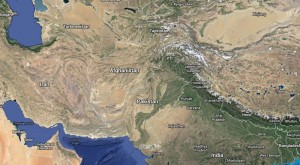
It was not clear if the attacker set the vest off deliberately. He had run into the home of the elder, Jan Mohammad Afridi, in the city’s Chamkani area, after local residents found him suspicious and the police started chasing him, said police chief Ahsan Shah.
Peshawar is the capital of Khyber Pakhtunkhwa province, which lies next to tribal areas that are bases for several militant networks including the Pakistani Taliban.
It was not known if Afridi, who was in the opposite part of the house at the time, was the initial target. Shah said police surrounded the house and exchanged gunfire with the bomber.
At some point, his explosives were detonated although it was unclear whether the assailant blew himself up or if one of the bullets from the gunfire set off the explosives.
Shah said half of Afridi’s house was completely destroyed in the blast and that four bodies of women were recovered from the rubble. He said five others in the house, including a woman and two children, were wounded. Afridi is a prominent member of the local “peace committee,” a group that opposes militants in the area.
Also in the northwest on Monday, a roadside bomb struck a polio vaccination team in the village of Khugekhel in the Khyber tribal region, near the Afghan border, wounding three security troops who were escorting the team, said Tahir Shah, a government official.
The polio workers were unhurt and continued with vaccinations during what was the first day of the anti-polio campaign in the region, he said.
Anti-polio teams have been frequently targeted in Pakistan by Islamic militants who consider the vaccination campaigns a tool for spying and claim the vaccine makes boys sterile.
Also Monday, gunmen shot and killed a local employee of the U.S. consulate in Peshawar, said Arif Khan, a local police official.
Attackers riding on a motorbike struck when Faisal Saeed was walking home in the Gulbahar area, said Khan.
He said the identity card in Saeed’s pocket revealed, and relatives confirmed, that he was employed at the consulate as a computer networking expert.
Khan said that police were looking into the cause of Saeed’s killing and investigating the matter from all aspects.
The U.S. Embassy in Islamabad called the killing of one of their employees a “tragic incident.”
“We strongly condemn this brutal and senseless death, and express our heartfelt condolences to the family,” the embassy said in a statement.
Elsewhere in Pakistan, separatists from the southwestern Baluchistan province blew up three gas pipelines in the central Rahim Yar Khan district, cutting supplies to millions of households overnight, according to the head of Sui Northern Gas, Arif Hameed.
Hameed said the pipelines would take at least two days to fix. The separatist group, the Baluch Republican Army, claimed responsibility for the attack. Its spokesman, Sarbaz Baluch, said the late Sunday attack was in response to the discovery earlier of dead bodies of Baluch activists.
Baluch separatists have been waging a low-level insurgency for years against the Pakistani government.
Hameed also said that the gas supplies to Pakistan’s most prosperous province of Punjab have been badly affected.
RELATED STORIES
Bomb kills 20 troops in northwest Pakistan
Bomb targets Pakistani police patrol, kills 7